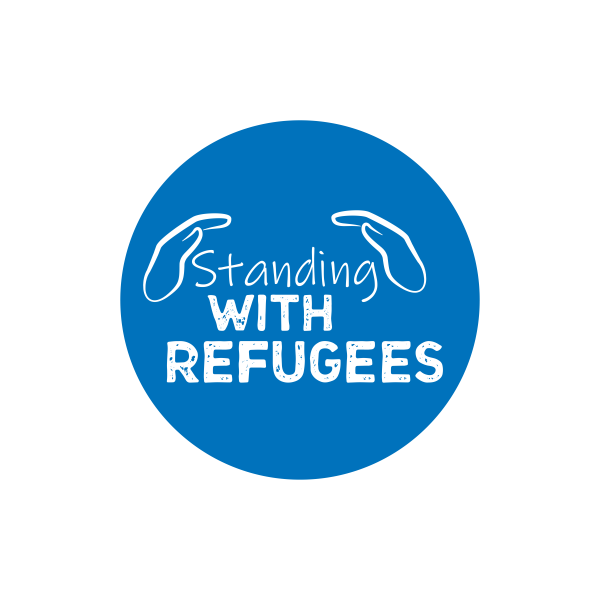
One of the aims behind the creation of the Swiss Foundation for UNHCR, Switzerland for UNHCR, is to raise awareness of the refugee issues in Switzerland. What better way to do this than to publish a series of articles highlighting the various local initiatives and actors who are committed to refugees and migrants? Standing with Refugees presents those people like you and me who wanted to bring concrete help to people forced to flee or seeking opportunities elsewhere who arrived in Switzerland. For our tenth article, we went to meet Cathlene Bell, programme manager at Capacity.
I'm very proud to represent Capacity, which is an organization based in Zurich, although our team is from all across Switzerland. Since 2015, we have been dedicated to responding to this very important issue of creating a feeling of belonging for those who have experienced being a refugee or a migrant. We are the first incubator of its kind in Zurich, choosing the approach of a talent and a startup incubator to respond to this identified need. It's really important for us to bridge the gap for migrant and refugee entrepreneurs, who we call “migrapreneurs”, to allow them to seek out the resources that they need. It was made with an understanding of what that experience entails, what it comes with, and making sure that we create a win-win-win situation for those who are going through this experience, for local Swiss communities and companies, and for broader social and socioeconomic understanding at large, for anyone who comes into contact with this challenge of integration.
We pride ourselves on being an organization that is led by a really dynamic and committed team of people who themselves have had experience either as a refugee or a migrant. We were founded in 2015, and since that time, about 120 participants graduated with a very high completion rate, representing over 50 nationalities. Furthermore, we have had around 250 mentors, talent coaches and trainers until today. Our overall community of learners and supporters spans in the thousands at this point.
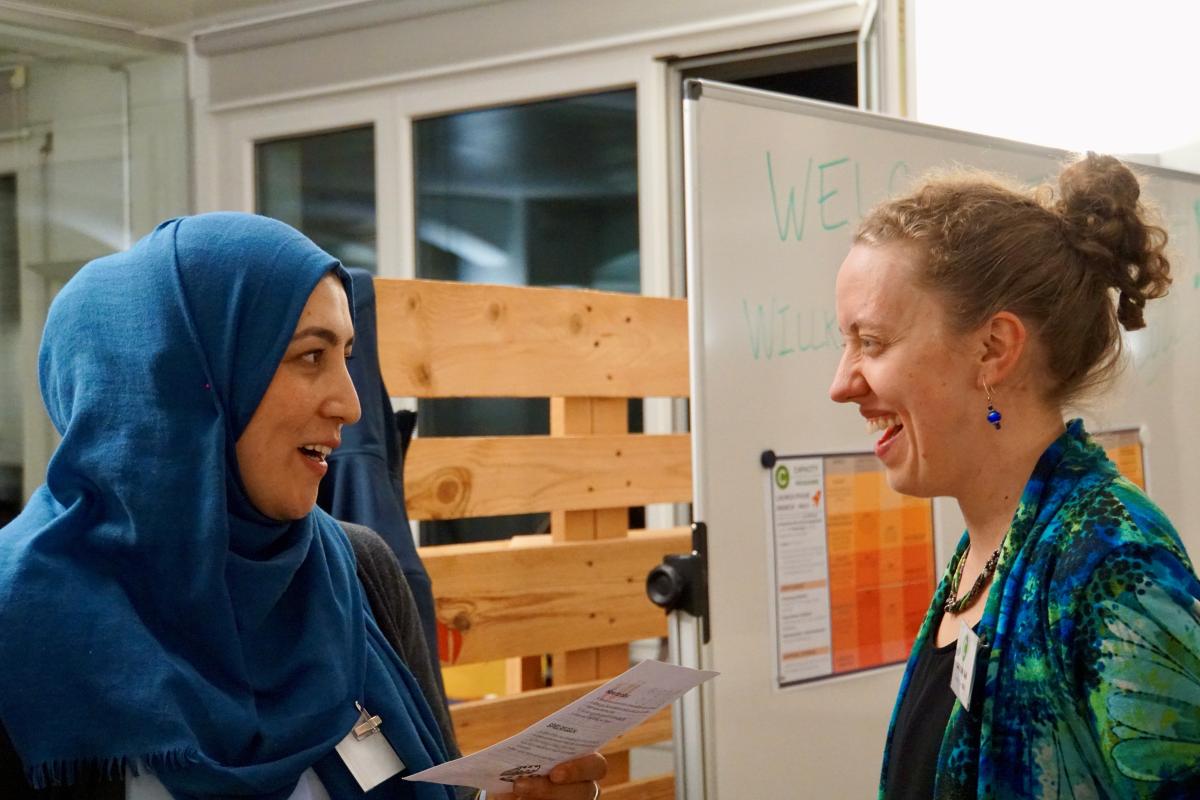
What we have found is that those who have undertaken this journey of migration or of forced displacement are capable of responding to adversity using a lot of creativity and a lot of resilience, but it doesn't always come so easily.
For us, the foundation of what we do is the recognition that work is a source of dignity. When we initially started Capacity, we wanted to work primarily in labour market integration, but entrepreneurship remains the easiest and quickest step to join the labour market. Many of the people who come to us have tried to join the labour market, but have encountered difficulties because of a number of systemic issues. Therefore, they turned to entrepreneurship because the creative problem solver in them comes out and says, “okay, let's find another way”.
We first set up our entrepreneurship programme dedicated to helping people work on their business idea and take it off the ground. Recently, we also launched our new programme called Access, which focuses on labour market integration. Our approach is very holistic, we work not only on a business idea or a project but especially with the human behind the idea. We look for candidates who bring that extra tenacity, really wanting to dig in and do the work, people who show a readiness to commit to the work: strategizing, introspecting, reflection, testing, and building relationships.
Overtime, we have built a curriculum that really fosters growth. Not only of the project, but of the person, because socioeconomic integration is not just about leveraging skills, but also about responding to the often underappreciated or underrecognized psychological implications that take place for those who come into a new country, either as a refugee, or a migrant.
Our candidates usually go through a cycle of rejection of skills or dependence on government -on welfare- that is incredibly demoralizing. What we seek to do is to re-moralize, to re-encourage, and to help people remember what's already there. We do it while perhaps realigning it slightly so that other people can see it as well. This is what we seek to do at Capacity and we also do it using a very community-driven approach.
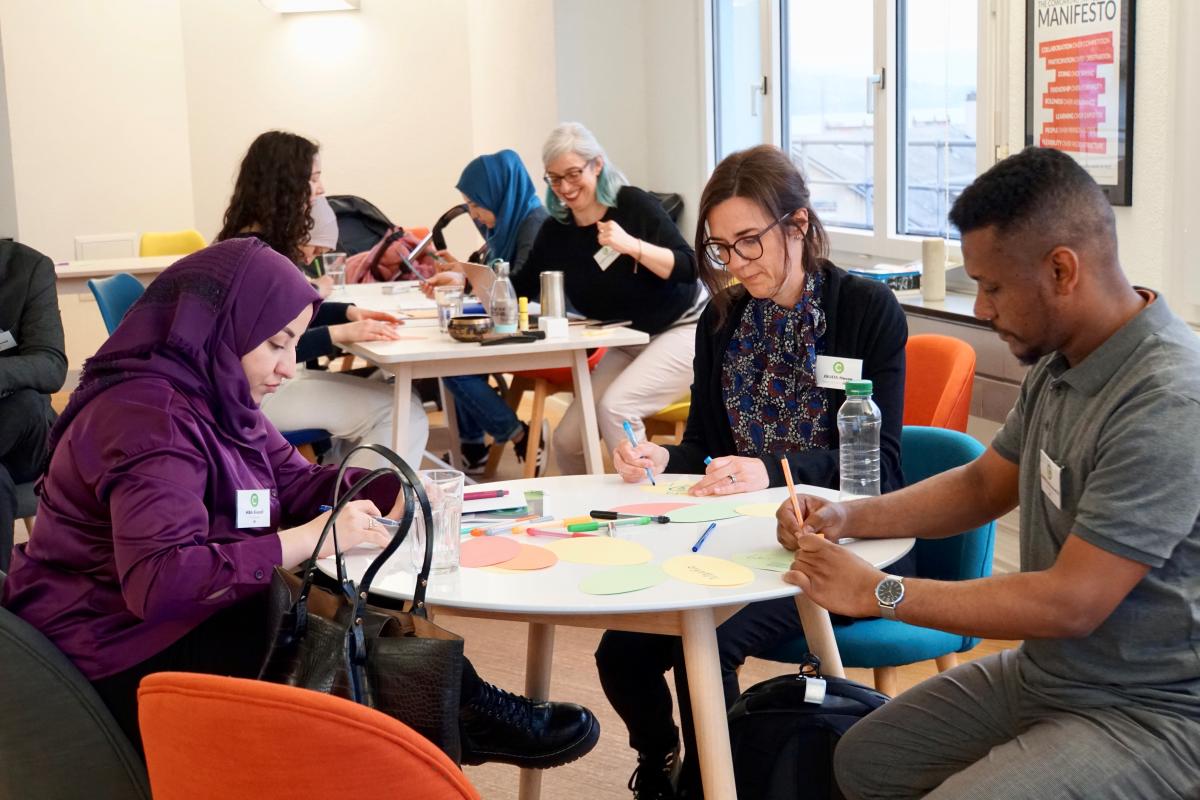
Our first phase of the Entrepreneurship programme, is called “Launch” and is purely an ideation phase. We work with participants who have an idea, and we put it through a full range of tests and exercises to see if at the end of that two months-time we identify its viability. This phase has its implications on a project, but also on the person, there's a lot of confidence-building as well: Do I believe in myself to the extent that is needed to believe in my project, and to help other people believe in it, too? We do this through the curriculum, through the team, but also through the creation of relationships between each entrepreneur and what we call a dedicated "personal activator of leadership": a sort of mentor who helps activate that leader within each participant.
Those projects we do deem as viable are then invited to the next phase of our work, which is called “Boost”. And “Boost” is very much where rubber meets the road, creating your business model canvas and all the tools necessary to pitch the entire project by the end of the programme in November to potential investors or to potential clients. We have a pitch party where we invite as many people as we can fit into a room -COVID permitting- and have everyone pitch their project. In addition, they all have their stands where they can make meaningful connections.
The reason we decided to work through work with work is because it works! We found that there is such an opportunity for mutual gain in so many different aspects. As robust as the Swiss economy and labor market seems, there is an enormous potential for added value, and we believe that this added value comes from diversity. What we seek to do is to work on both sides of the table by looking at locals with influence, with a long-standing establishment here in Switzerland, whether it's through corporate entities, potential funders, or more recently, those in the HR sector who have the opportunity to be changemakers in their industry. We tell them: "listen, we're seeing that your company, your sector, is for some reason or another, not achieving the diversity and inclusion goals that you've been setting out. We want to help you bridge that gap. We want to help you reach those goals. And to do so is going to require mutual conversation, mutual understanding, mutual humility, and mutual readiness to learn and grow."
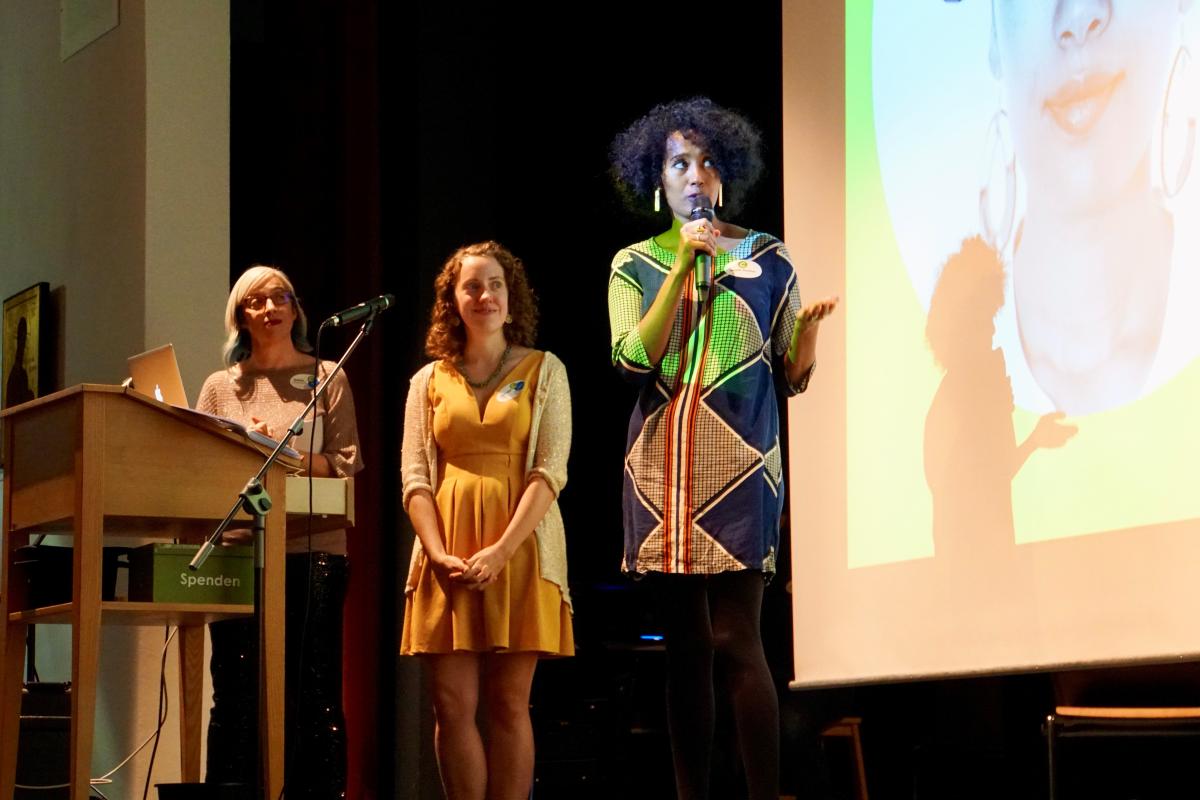
This is where we seek to work in Capacity, and we do this through the relationships that we build, in the funding relationships that we initiate, in the corporate and individual volunteers that we engage, and in our communications as well. We absolutely refuse to say we're here to help refugees and migrants. Rather we are here to seek to understand the experience of people who went through a situation of forced displacement or migration. We're here to learn, and to co-create success. So work is, in our opinion, the place to work, to leverage our skills, our talents, our time and passion. We seek to help those coming to Switzerland understand how to integrate into Switzerland in full expression of their beautifully diverse selves while educating those who are already integrated in Swiss society how to better welcome these newcomers. The world of work is the optimal place to have these conversations and to facilitate this sort of connection.
Around 2015, there was this realization that something needed to change to help refugees to better integrate, and it reached a new intensity. And what's interesting about the co-founders of Capacity is that many of them were themselves personally impacted by this refugee situation back then. It really became a meeting of the minds of people believing that we must do something.
As I said earlier, the initial idea was labour market integration, to see what could be done because we, the team and the co-founders, also experienced a lot of challenges when trying to fit in this labour market ourselves. And we thought, “well, now that we have achieved a certain degree of success, let's see how we can pass that onwards”.
It became evident that entrepreneurship would be a programme that would be more quickly viable. It was easier and a faster turnaround at the time. And what has been beautiful with the programme is that, although as many as 50% of the projects end up being viable long-term, which is one of the highest statistics for incubators in Switzerland, we also noticed that success doesn't just mean a viable business. It can also mean that an entrepreneurship programme graduate then got a job and got to leverage all of their learnings, transfering them over to this new professional context.
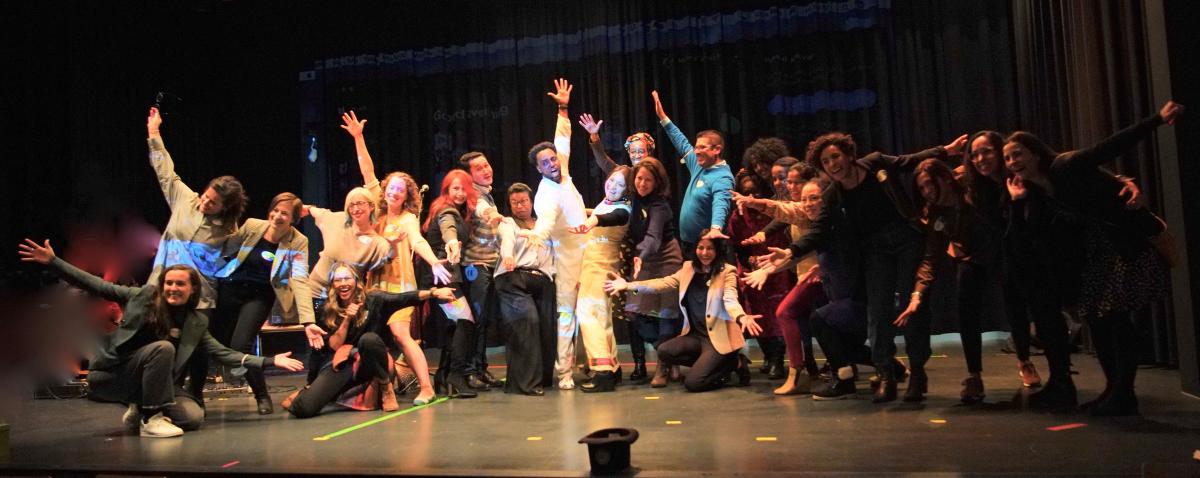
It was my first day on the job. I showed up at our internal event, which happened to be a storytelling event called the Migration Circle. Our intent with these sessions is to create a space where those consenting can share their stories of migration, of exile, of resilience. While sharing our stories, we can understand each other a bit better and also better understand ourselves because our stories actually have massive implications on our work: work is just an extension of who we are, of our story.
I chose to share my story of being born in a high-control religious group, which could even be called a sect. I chose to cut myself off from all of it, and managed to do so while integrating here in Switzerland, and was very isolated linguistically, socially, financially. I had to rebuild my life from scratch, and although it was difficult I'm very proud of what I have achieved.
But what remained were questions: Who's ever going to really understand you? Is there a place for a story like yours? I say that recognizing that my story, though challenging, is nowhere near what many of the people I try to help have gone through. It can be challenging to not fall into a space of guilt, minimizing my own experience or playing small, when actually it's in playing big with full acceptance of my story that can be really of great value to others.
At the end of that Migration Circle, some of the programme participants who'd gone through very acutely challenging situations come to me and say, “Thank you so much for sharing your story because I feel like you understand me through what you've been through”.
This experience reassured me that Capacity is committed to intersectionality. There's no catering to one particular demographic over another. This organisation recognizes that, while we can acknowledge that being a refugee is linked to a certain permit status or certain specific challenges, at the end of the day, we're all humans. To create a space for community-building, for understanding and co-creating success, either in the form of entrepreneurship or labor market integration. We all walk away feeling more visible, more understood, and more capable of creating a better world.
2022 is shaping up to be a very interesting year for Capacity. We are in our seventh iteration of our entrepreneurship programme, and it was a delight to see all these brave, creative problem solvers arrive ready to go, ready to take on the ideas, the dreams that are being brought to the table.
I am also seeing in our Access (labour market integration) programme so much readiness to respond to this pressing need, which is really exciting. The Access project is a pilot, but we are quite confident that it's going to go well and we look forward to having a full-fledged programme later this year that will be able to offer even more value as it will have sufficient funds to be its full, robust self.
However, as we all know, this year is also particularly scary because of the situation in Ukraine. And we are seeing a very urgent need to respond while continuing to advocate for intersectional integration. We wish to provide support for every demographic impacted by this specific crisis, while continuing to co-create success with those who were impacted by crises other than that of Ukraine, but which are getting less media coverage these days.
As we speak, our team is working very hard to create a “fast-track” version of our programmes so that we can respond quickly in support of those who we know are arriving now by the thousands. They need support. We know that we are well-positioned to respond, and that we have a lot of institutional knowledge at the ready. The key at this point is ensuring that the necessary resources are in place so that our participants can be effectively set up for success.
It's a fascinating time to be doing this work because while many in the general population might be feeling a sense of helplessness or fear right now, we have the capacity to act.
The first answer I think will come quite naturally to the readers of the article, which is “keep listening”.
Our capacity to listen deeply, not with intent to respond, but with intent to understand is a highly underappreciated skill worldwide and across all relationships, particularly in this sector. There is an unending need for stories to be listened to with respect and with a willingness to challenge potential biases or assumptions that could be lodged in our minds without even realizing it. This is a particularly potent moment in which we have the opportunity to listen to the stories beyond what the mainstream media is covering. Stories that tell us what it is to be a refugee or to have experienced a situation of forced exile. Listening to those stories with an open mind is a tremendous opportunity for learning.
Some readers might be searching for concrete ways to respond to the Ukraine crisis, and there are many ways in which you can do so with Capacity, with several potential options for someone who might want to engage directly with us.
But the fastest and most potent way to respond right now is financially. And that is a tough thing for many of us in the non-profit sector to dare to ask for, but it can make an extraordinary difference. We are all humans with basic needs to be met. And by empowering an organization, especially the smaller local ones, you are committing to creating serious change right there in your neighborhood. And for Capacity, your readers can have faith and confidence that the work of an organization like ours will come right back to the donor. We should not feel powerless at this moment; there is an opportunity for all of us to act.